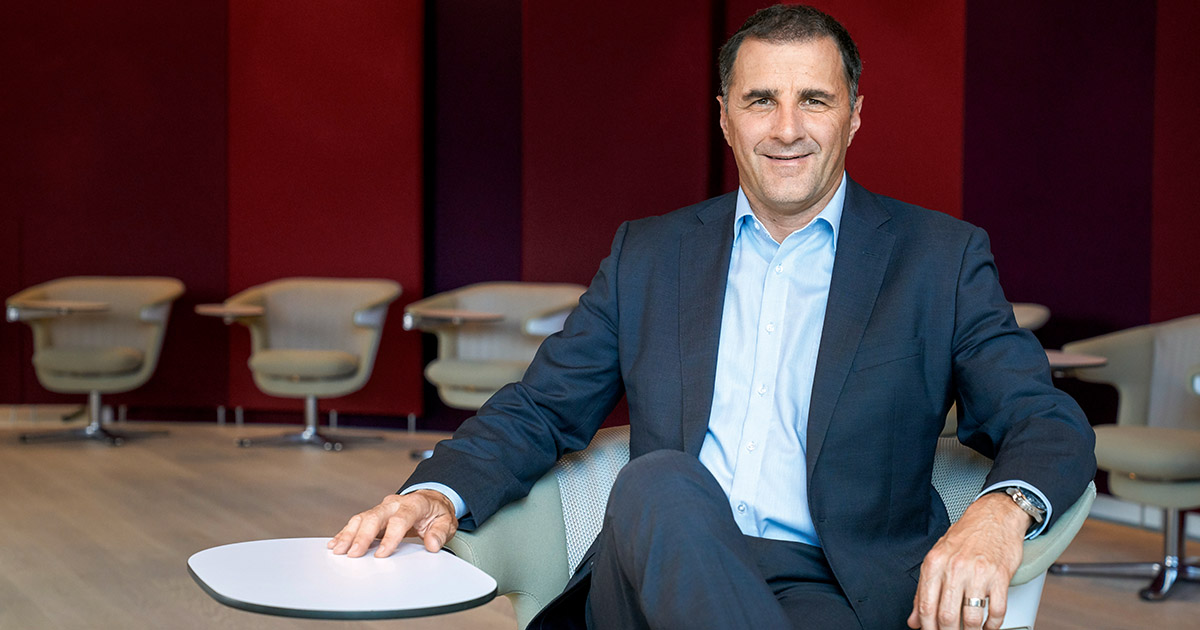Interview with Urs Lehner
"Digital transformation has to support the development of new business models"
How is digital transformation progressing at Swiss businesses and what direction is it taking? In this interview, Urs Lehner, Head of Business Customers at Swisscom, talks about new opportunities and existing potential for improvement.
Text: Sara Wyss , Images: Swisscom
June 9th 2022

Urs Lehner, where do Swiss businesses currently stand in respect of digital transformation?
Swiss companies are more digital than ever – with the coronavirus pandemic having greatly accelerated this shift, of course. In discussions with our customers, it’s no longer about why they should pursue digitalisation projects, but how. But ICT solutions alone are not sufficient to enable swift digitalisation. People are an equally important factor. Companies therefore have to take steps to address the skill gap, both in terms of competent use of digital devices and understanding current user behaviour. Employers must specifically support the development of the necessary skills. In addition, there is an urgent need for the promotion of STEM subjects in the Swiss education system and additional efforts to increase the number of trained engineering professionals. After all, digital transformation cannot happen without skilled workers.
We have been seeing further progress in digital transformation in 2022 as well. In your view, which aspects are especially interesting and noteworthy at this time?
Talent recruitment, promotion and retention will be one of the biggest challenges for IT companies, including Swisscom, in the years ahead. What ICT can contribute here is tools and technologies that improve the working environment for employees. In other words, the employee experience. Productivity tools, devices and applications are key to this.
Sustainability is also a pressing task and core responsibility for us all. I believe we have an obligation to use the opportunities provided by digitalisation to make our own contribution in this area. This applies to Swisscom itself, but we also want to support our customers in their efforts. Data is fundamental to this, as it helps us to recognise energy consumption patterns, identify potential for savings and implement sustainable solutions. Digitalisation and data-driven business are key stepping stones on the path to climate neutrality..
 Urs Lehner is the Head of Business Customers and a member of the Swisscom Group Executive Board.
Urs Lehner is the Head of Business Customers and a member of the Swisscom Group Executive Board.
You are in regular dialogue with decision-makers. What are the most important technological and business challenges facing Swiss companies looking to stay at the cutting edge of what they do?
The shift towards hybrid working, the establishment of cloud solutions, the increasing connectivity of devices and the use of the corresponding data are important steps for companies. In this context, however, conventional security architectures offer inadequate protection against unauthorised access to company data.
With parallel use of in-house IT infrastructure and cloud offerings, different operating models have to coexist. Workload transformation between these models must be integrally planned and orchestrated, including the relevant security architectures.
"One goal of digital transformation is to generate business value from ever bigger data sets."
Urs Lehner
What recommendations do you have for decision-makers?
Remote working has now become established practice and many processes and systems adapted at short notice have been stabilised. The technology now has to serve the development of new business models. This is a matter of generating optimal business value from the adapted infrastructure and growing volumes of data. We will be able to make processes more efficient and modern and view information and data in a new way so as to change how they are combined and processed. All of this with the goal of better meeting customer needs and employee expectations.
Looking ahead to the near future: how will we use IT resources in the next two to three years? What do you see happening here?
I am convinced that we will see a strong upsurge in the Internet of Things (IoT). This will enable companies to make their business processes more sustainable and reduce CO2 emissions, for example.
There will be increased use of AI and hyperautomation. These technologies pay off, especially for companies with a strong data strategy and the ability to use the right high-quality data to provide services with clear customer benefits. Technology that supports data processing and analysis will continue to boom.
Urs Lehner
Urs Lehner has been the Head of Business Customers and a member of the Swisscom Group Executive Board since 2017. After his degree in IT Engineering, he completed an Executive MBA programme in Business Engineering at the University of St. Gallen. In 1997, he joined the independent IT service company Trivadis, where he held various roles, including COO, partner and member of the Board of Directors, and made important contributions to the company’s development. In 2011, he joined Swisscom as Head of Marketing & Sales Corporate Business and subsequently held various management positions in the Enterprise Customers segment. Since January 2020 and the merger of the SME and Corporate Customers segments, he has been the head of the entire Business Customers division at Swisscom.